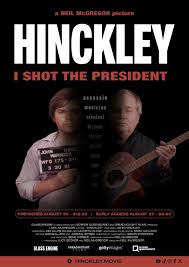
HINCKLEY. I SHOT THE PRESIDENT
Australia, 2024, 90 minutes, Colour.
Directed by Neil McGregor.
John Hinckley Jr attempted to assassinate President Ronald Reagan in March 1981. The president survived as did three of his staff who were also wounded. Hinckley was arrested, tried, found not guilty by reason of insanity.
Audiences who remember the time the impact of the assassination attempt, break in surviving, Secretary James Brady and his being wounded, his later career in promoting gun legislation reform. But, many will not remember much about Hinckley himself except his alleged motivation, to make an impression on actress Jodie Foster.
Audiences for whom this episode in American history is very much in the past, will find this documentary a journey back into the US of the 1970s and 1980s.
The film has been directed by Neil McGregor, sometime producer for Screen Queensland, documentary maker. The great value of the film is that it is the personal narrative of Hinckley himself, age 67, spending 35 years in the St Elizabeth Institute in Washington DC, assessed as rehabilitated, finally released in the early 2020s. Hinckley speaks to camera, an almost 90 minute interview with him, a detailed explanation of himself, his life, his motivation, the shooting, the aftermath.
At 67, Hinckley is a rather burly figure, articulate, but his commentary delivered in almost deadpan style, slow, with time to think, on his part and on our part.
For many Americans, Hinckley did the unforgivable, attempting to assassinate the President. Comments are inserted declaring he should remain in jail for the rest of his life. On the other hand, there is the issue of time served for crime, issues of release, parole, release without conditions, which is what after many decades Hinckley received. And, then, there is the issue of mental illness, psychiatric treatment, therapy, rehabilitation. And Hinckley himself makes comment on all these issues.
The director includes a great deal of contemporary footage, America during the 1950s when Hinckley was growing up, New York and Hollywood in the 1970s, footage of the assassination attempt and the aftermath. Hinckley was born in 1955, grew up in Dallas, something of a loner in his early years, a great love for music and music career ambitions. Some comments are made about his psychological condition including aspects of schizophrenia, narcissism, depression.
He is remembered for his obsession with Jodie Foster. But in his explanations about seeing Taxi Driver, he also became fixated on Robert De Niro’s character, identifying with Travis Bickle, the loner, and his wanting to rescue and save the young prostitute played by Jodie Foster. Which led for some years with his preoccupation, writing letters, phone calls (which he recorded and some are played here), some stalking at Yale University. And the decision that he would impress the actress if he were to do something significant, choosing the President, the film showing the atmosphere of the 1980 campaign between Jimmy Carter and Ronald Reagan, Hinckley initially following Carter but on his defeat, targeting Reagan.
There is very critical comments about the jury’s decision about Hinckley’s not being guilty, but being confined to an institution criticism of the insanity plea and move for its abolition.
We see the older Hinckley at home, driving, going to a music store and conversing with a veteran music concert, reminiscing about a fellow patient at St Elizabeth’s and his tribute to her role in helping him over 20 years. And, we see him singing, composing songs, ambitions to perform in a concert – and a somewhat ironical finale seeing him with his guitar going on stage in an empty theatre. He says that music saved him and is one of his ways of offering something to the public by way of reparation for his crime.
With his even-tempered narration, with his explanations of what was wrong with him, quite extensive explanation is an acknowledgement of the reality of his mental illness, his poor judgements, his obsessions, this documentary offers a cogent argument about the value of rehabilitation.
(And, just before the film is released in August 2024, there is a brief insert glimpse of the assassination attempt on Donald Trump in Butler, Pennsylvania – reminding us that with the death of that shooter, no first-hand explanation in the way that we have heard John Hinckley reflecting on himself and his life.)